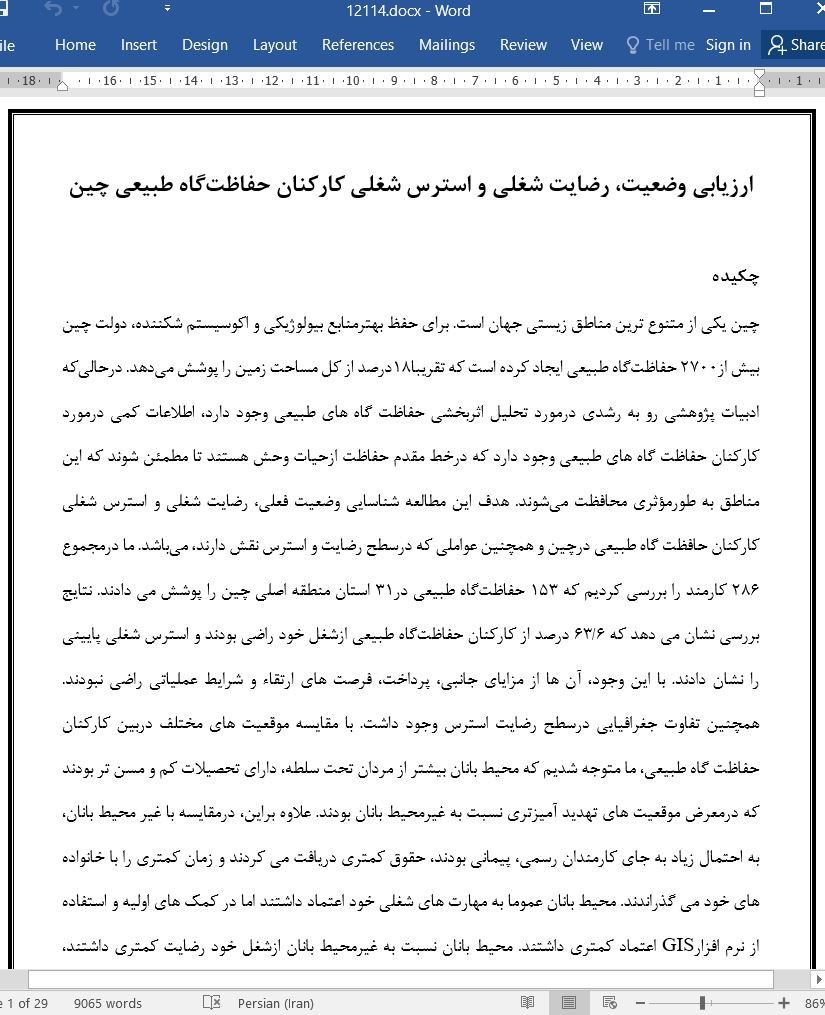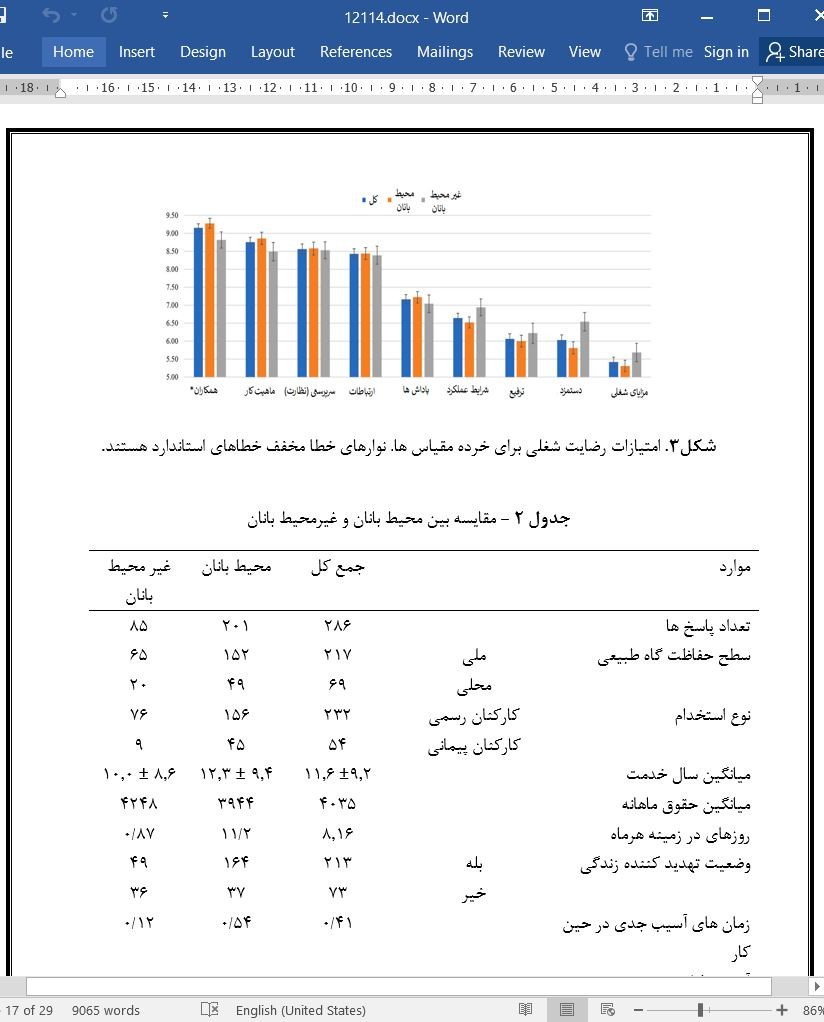
ارزیابی وضعیت، رضایت شغلی و استرس شغلی کارکنان حفاظت گاه طبیعی چین
چکیده
چین یکی از متنوع ترین مناطق زیستی جهان است. برای حفظ بهترمنابع بیولوژیکی و اکوسیستم شکننده، دولت چین بیش از2700 حفاظت گاه طبیعی ایجاد کرده است که تقریبا18درصد از کل مساحت زمین را پوشش می دهد. درحالی که ادبیات پژوهشی رو به رشدی درمورد تحلیل اثربخشی حفاظت گاه های طبیعی وجود دارد، اطلاعات کمی درمورد کارکنان حفاظت گاه های طبیعی وجود دارد که درخط مقدم حفاظت ازحیات وحش هستند تا مطمئن شوند که این مناطق به طورمؤثری محافظت می شوند. هدف این مطالعه شناسایی وضعیت فعلی، رضایت شغلی و استرس شغلی کارکنان حافظت گاه طبیعی درچین و همچنین عواملی که درسطح رضایت و استرس نقش دارند، می باشد. ما درمجموع 286 کارمند را بررسی کردیم که 153 حفاظت گاه طبیعی در31 استان منطقه اصلی چین را پوشش می دادند. نتایج بررسی نشان می دهد که 6/63 درصد از کارکنان حفاظت گاه طبیعی ازشغل خود راضی بودند و استرس شغلی پایینی را نشان دادند. با این وجود، آن ها از مزایای جانبی، پرداخت، فرصت های ارتقاء و شرایط عملیاتی راضی نبودند. همچنین تفاوت جغرافیایی درسطح رضایت استرس وجود داشت. با مقایسه موقعیت های مختلف دربین کارکنان حفاظت گاه طبیعی، ما متوجه شدیم که محیط بانان بیشتر از مردان تحت سلطه، دارای تحصیلات کم و مسن تر بودند که درمعرض موقعیت های تهدید آمیزتری نسبت به غیرمحیط بانان بودند. علاوه براین، درمقایسه با غیر محیط بانان، به احتمال زیاد به جای کارمندان رسمی، پیمانی بودند، حقوق کمتری دریافت می کردند و زمان کمتری را با خانواده های خود می گذراندند. محیط بانان عموما به مهارت های شغلی خود اعتماد داشتند اما در کمک های اولیه و استفاده از نرم افزارGIS اعتماد کمتری داشتند. محیط بانان نسبت به غیرمحیط بانان ازشغل خود رضایت کمتری داشتند، اگرچه این تفاوت معنی دار نبود. فقط حدود 58درصد از کارکنان حفاظت طبیعی احساس می کردند که آموزش کافی دریافت کرده اند. حدود3/1 از کارکنان حفاظت طبیعی دوست داشتند کارخود را ترک کنند. دلایل آن ها شامل پرداخت و پاداش کم، عدم حمایت زیرساختی، عدم توانایی اجرای قانون هنگام مواجهه با کارهای غیرقانونی و زندگی بسیار دور ازخانواده ها بود. درنهایت، نتایج مدل نشان داد که صرف وقت بیشتر با خانواده، درآمد بالاتر، آموزش بیشتر و علاقه بیشتر به طبیعت بطور قابل توجه و معناداری به رضایت شغلی کلی کمک می کند. عواملی مانند افزایش سن، صرف وقت بیشتر با خانواده، درآمد بیشتر، آموزش بیشتر و اعتماد بیشتر به مهارت های حرفه ای، با استرس کارکنان حفاظت طبیعی همبستگی منفی داشت. نتایج ما پیشنهاد می کنند که برای بهبود شرایط کارکنان حفاظت گاه طبیعی و مدیریت مناطق حفاظت شده، دولت ها و مدیران باید آموزش های کافی و افزایش درآمد و پاداش ها را برای شناسایی سهم کارکنان حفاظت گاه طبیعی، همچنین تغییر مکانیسم استخدام برای جذب و حفظ کارکنان جدید را فراهم کنند.
4 . بحث
نتایج ما نشان داد که کارکنان حفاظت گاه طبیعی بطورکلی از شغل خود راضی بودند و استرس ادراک شده نسبتا پایینی داشتند. اگرچه محیط بانان و غیرمحیط بانان در حفاظت گاه های طبیعی استخدام شده اند، اما محل کار، شرایط و وظایف آن ها بسیار متفاوت است که باعث اختلاف در ادراک شغل، رضایت و استرس می شود. محیط بانان معمولا درمناطق دور افتاده و توسعه نیافته کار می کنند، درحالی که افراد غیرمحیط بان در مقر یا دفاتر اصلی که عمدتا در شهرها قرار دارند، کار می کنند. مخصوصا، چون محیط بانان نمی توانند روزانه به خانه برگردند و معمولا باید یک هفته تا بیست روز متوالی درهرماه کار کنند، زمان صرف شده با خانواده بسیار محدود است. اکثر محیط بانان (2/66 درصد) کمتر از10 روز را با خانواده خود سپری کردند که کمتر ازمیانگین منطقه ای آسیا (76 درصد) بود (WWF،2016). همسو با یافته های قبلی، نتایج ما نیز تایید می کند که تعداد روزهایی که یک کارمند حفاظت گاه با خانواده خود می گذراند، به شدت بر رضایت شغلی تاثیر می گذارد (اسپیرا و همکاران ،2019؛ الیسون،2006). علاوه براین، از آنجایی که منابع آموزشی معمولا درمناطق دور افتاده یا شهرهای کوچک کمبود دارند، بسیاری از کارکنان حفاظت گاه طبیعی مجبورند فرزندان و همسر خود را به شهرهای دیگر دور از شهرستان خود بفرستند که منجر به جدایی بیشتر از اعضای خانواده خود می شوند.
Abstract
China is one of the most biodiverse regions of the world. To better preserve its biological resources and the fragile ecosystem, China’s government has established more than 2700 nature reserves, covering approximately 18% of its total land area. While there is a growing body of literature analyzing the effectiveness of nature reserves, little is known about the nature reserve staff who are on the frontlines of wildlife conservation to ensure these areas are effectively protected. This study aims to identify the current status, job satisfaction, and occupation stress of nature reserve staff in China, as well as what factors contribute to the level of satisfaction and stress. We surveyed a total of 286 staff covering 153 nature reserves in 31 provinces of mainland China. The survey results indicate that 63.6% of nature reserve staff were satisfied with their jobs and showed low occupational stress. Nonetheless, they were not satisfied with fringe benefits, payment, promotion opportunities, and operating conditions. There was also a geographic difference in the level of satisfaction and stress. Comparing different positions among nature reserve staff, we found that rangers were more male-dominated, less educated, older and had been exposed to more life-threatening situations than non-rangers. In addition, they were more likely to be contractors instead of formal employees, receive lower pay and spend less time with their families compared to non-rangers. Rangers were generally confident in their professional skills and but less confident in first aid and the use of GIS software. The rangers were less satisfied with their jobs compared to non-rangers, although the difference was not significant. Only about 58% of the nature reserve staff felt that they had received enough training. About 1/3 of the nature reserve staff would like to quit their job. The reasons include low payment and rewards, lack of infrastructure support, no law enforcement capability when encountering illegal activities and living too far from families. Finally, the model results show that more time spent with family, higher income, more training, and more affection for nature significantly contributed to the overall job satisfaction. Factors like the increase in age, more time with family, higher income, more training, and higher confidence in professional skills, were negatively correlated with the stress of nature reserve staff. Our results suggest that to improve the conditions of nature reserve staff and the management of protected areas, governments and managers need to provide enough training and increase income and rewards to recognize the contribution of nature reserve staff, as well as change the hiring mechanism to attract and keep new employees.
4. Discussion
Our results showed that nature reserve staff were generally satisfied with their jobs and the perceived stress was relatively low. Although both rangers and non-rangers are employed by nature reserves, their working locations, conditions, and tasks are very different, which causes disparities in job perception, satisfaction and stress. Rangers usually work in remote and undeveloped areas, while non-rangers work in the headquarters or main offices, mostly located in towns. Especially, because rangers cannot return home daily and usually need to work a week to 20 days in a row every month, the time spent with family is very limited. The majority of the rangers (66.2%) spent fewer than 10 days with their family, which was lower than the regional average for Asia (76%) (WWF, 2016). Our results also support that the number of days that a reserve staff spends with their family hugely influences job satisfaction, similar to previous findings (Spira et al., 2019; Eliason, 2006). Moreover, as education resources are usually lacking in remote areas or small towns, many nature reserve staff have to send their children and spouse to other cities away from their county, leading to further separation from their family members.
چکیده
1 . مقدمه
2 . مواد و روش ها
2 . 1 . جمع آوری داده ها
2 . 2 . ابزار نظرسنجی
2 . 3 . تعریف محیط بانان
2 . 4 . تجزیه و تحلیل داده ها
3 . نتایج
3 . 1 . توزیع پاسخ دهندگان
3 . 2 . مقایسه بین کارگران محیط بان و غیرمحیط بان
3 . 3 . تفاوت بین حفاظت گاه طبیعی ملی و محلی
3 . 4 . تفاوت ها میان مناطق
3 . 5 . پیش بینی کننده های رضایت شغلی و استرس کاری
4 . بحث
اعلام منافع رقابتی
قدر دانی ها
ضمیمه A . اطلاعات پشتیبانی
منابع
Abstract
1. Introduction
2. Material and methods
2.1. Data collection
2.2. Survey instrument
2.3. Definition of rangers
2.4. Data analysis
3. Results
3.1. Distribution of respondents
3.2. Comparison between rangers and non-ranger workers
3.3. Differences between national and local nature reserves
3.4. Differences among regions
3.5. Predictors of job satisfaction and working stress
4. Discussion
Declaration of Competing Interest
Acknowledgments
Appendix A. Supplementary material
References
- اصل مقاله انگلیسی با فرمت ورد (word) با قابلیت ویرایش
- ترجمه فارسی مقاله با فرمت ورد (word) با قابلیت ویرایش، بدون آرم سایت ای ترجمه
- ترجمه فارسی مقاله با فرمت pdf، بدون آرم سایت ای ترجمه



